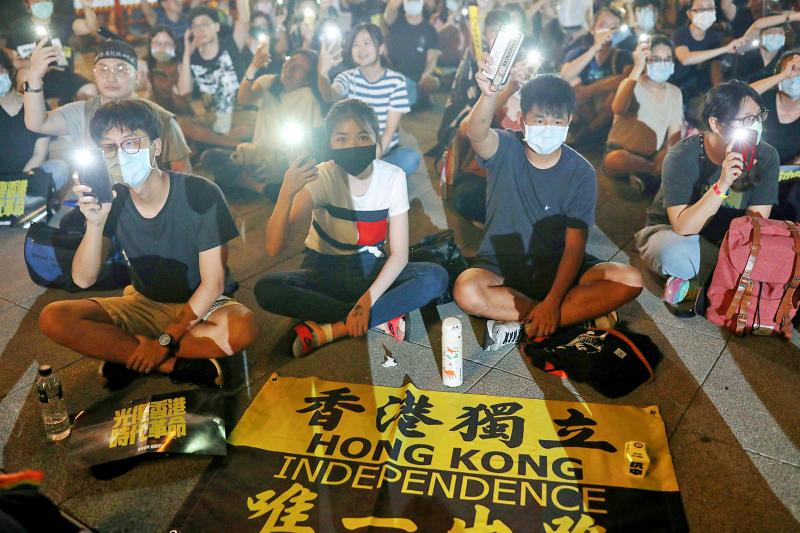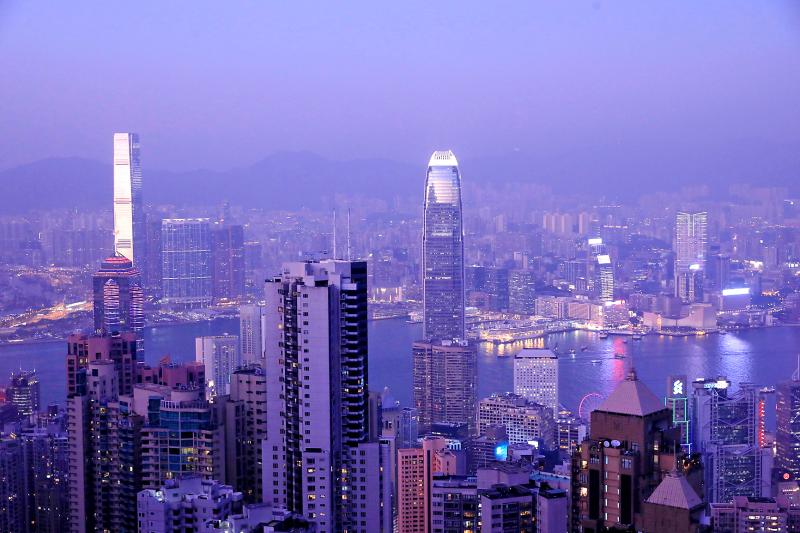The majority of Hong Kongers who sought asylum in Taiwan show signs of trauma related to political violence, while most have trouble adapting to life in their new home, a source who works with them said.
“Many of the victims were beaten by Hong Kong police, or were close with someone who was shot or killed during the protests,” the source said. “Their experiences have left them scarred and unable to return to where they came from.”
Many Hong Kongers who participated in anti-extradition protests in 2019 saw support for Hong Kong expressed in Taiwanese media, and by Taiwanese politicians in the run-up to the 2020 presidential election.

Photo: Reuters
“They thought that there would be plenty of social support for them in Taiwan, but after coming here they found that most Taiwanese don’t really care about Hong Kong,” the source said.
Those who fled to Taiwan from Hong Kong have had trouble finding a secure social network, and often find themselves feeling lonely, the source said, adding “their hearts remain in Hong Kong.”
Some of the asylum seekers came to Taiwan shortly after the protest movement started, others applied after the introduction of Hong Kong’s National Security Law, and yet others found themselves unable to leave Hong Kong at all after its government implemented strict border controls to stem the spread of the COVID-19 pandemic, the source said.

Photo: Reuters
“Some of those who made it to Taiwan safely feel guilty that they were able to leave while others are still trapped in Hong Kong. Taiwanese are unable to understand those feelings,” the source said.
Part of the frustration of Hong Kongers in Taiwan stems from feeling powerless to face up to the Chinese Communist Party, which destroyed the freedoms that Hong Kong enjoyed in the past, the source said.
“Most Hong Kongers of all age groups experience difficulties finding suitable employment and adapting to life,” the source said. “Some have opted to return to Hong Kong, only to be arrested when they arrive.”
Academia Sinica researcher Peng Jen-yu (彭仁郁) said there are concerns that Hong Kongers who experience trauma due to political violence could develop symptoms, including substance abuse and self-isolation, if adequate social support is absent.
“Some people who participated in the protests have witnessed partners or friends being injured by the police while they are powerless to help,” she said. “They also might have family members who don’t support their participation in the protests.”
Some Hong Kongers reported being ostracized by their families, she said, comparing the situation to protesters involved in Taiwan’s Sunflower movement who were scolded by parents and relatives for their involvement.
In some cases, Hong Kongers who were at the protests knew that police had made a record of their participation, so they decided to flee to Taiwan while they could, Peng said.
“Some were lucky enough to have family support, and their families sometimes send them money, but others are not so lucky and must rely on nongovernmental organizations for assistance,” she said.
The number of Hong Kongers who come to Taiwan and who see a future for themselves in the country is relatively low, Peng said, adding that most see Taiwan as a temporary home.

The Grand Hotel Taipei on Saturday confirmed that its information system had been illegally accessed and expressed its deepest apologies for the concern it has caused its customers, adding that the issue is being investigated by the Ministry of Justice Investigation Bureau. The hotel said that on Tuesday last week, it had discovered an external illegal intrusion into its information system. An initial digital forensic investigation confirmed that parts of the system had been accessed, it said, adding that the possibility that some customer data were stolen and leaked could not be ruled out. The actual scope and content of the affected data

‘LIKE-MINDED PARTNER’: Tako van Popta said it would be inappropriate to delay signing the deal with Taiwan because of China, adding he would promote the issue Canadian senators have stressed Taiwan’s importance for international trade and expressed enthusiasm for ensuring the Taiwan-Canada trade cooperation framework agreement is implemented this year. Representative to Canada Harry Tseng (曾厚仁) in an interview with the Central News Agency (CNA) said he was increasingly uneasy about Ottawa’s delays in signing the agreement, especially as Ottawa has warmed toward Beijing. There are “no negotiations left. Not only [is it] initialed, we have three versions of the text ready: English, French and Mandarin,” Tseng said. “That tells you how close we are to the final signature.” Tseng said that he hoped Canadian Prime Minister Mark Carney

President William Lai (賴清德) yesterday bestowed one of Taiwan’s highest honors on Saint Vincent and the Grenadines (SVG) Ambassador Andrea Clare Bowman in recognition of her contributions to bilateral ties. “By conferring the Order of Brilliant Star with Grand Cordon on Ambassador Bowman today, I want to sincerely thank her, on behalf of the Taiwanese people, for her outstanding contribution to deepening diplomatic ties between Taiwan and SVG,” Lai said at a ceremony held at the Presidential Office in Taipei. He noted that Bowman became SVG’s first ambassador to Taiwan in 2019 and

POSITIVE DEVELOPMENT: Japan and the US are expected to hold in-depth discussions on Taiwan-related issues during the meeting next month, Japanese sources said The holding of a Japan-US leaders’ meeting ahead of US President Donald Trump’s visit to China is positive news for Taiwan, former Japan-Taiwan Exchange Association representative Hiroyasu Izumi said yesterday. After the Liberal Democratic Party’s landslide victory in Japan’s House of Representatives election, Japanese Prime Minister Sanae Takaichi is scheduled to visit the US next month, where she is to meet with Trump ahead of the US president’s planned visit to China from March 31 to April 2 for a meeting with Chinese President Xi Jinping (習近平). Japan and the US are expected to hold in-depth discussions on Taiwan-related issues during the